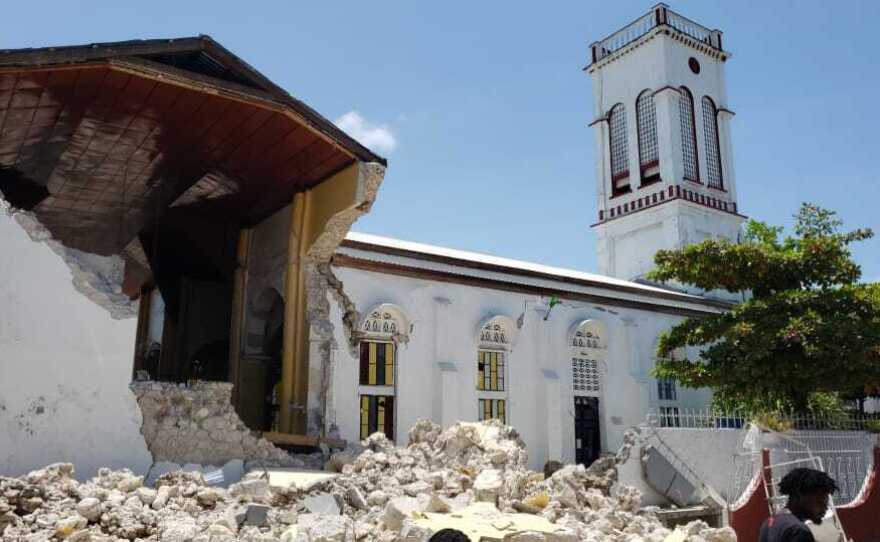Updated August 14, 2021 at 8:31 PM ET
A massive 7.2 magnitude earthquake struck Haiti on Saturday morning, the U.S. Geological Survey said, raising fears of destruction similar to the devastating 2010 quake that shattered the country.
At least 304 people have died and more than 1,800 were injured, according to Haiti's civil protection service. The USGS predicts the death toll could reach into the thousands.
"It looks like it's really bad," USGS geophysicist Paul Caruso told NPR. "There could be a lot of casualties." Caruso said Saturday's quake is on par with the 2010 quake because of its similar magnitude and because it occurred along the same fault line.
A 7.0-magnitude quake hit Haiti on Jan. 12, 2010, leaving an estimated 220,000 dead, some 1.5 million people displaced and about 300,000 injured.
Ariel Henry, Haiti's new prime minister, in a translated tweet extended his sympathies "to the parents of the victims of this violent earthquake which caused several losses of human and material lives in several geographical departments of the country."
Henry said he will declare a state of emergency for one month as the country assesses the damage from the disaster and sends teams to the area for search and rescue missions.
President Biden has authorized an immediate U.S. response and named Samantha Power, the U.S. AID administrator, to coordinate the effort, a White House official said.
The epicenter of the earthquake was 12 kilometers, or 7.5 miles, northeast of Saint-Louis-du-Sud and 10 kilometers deep, according to the USGS. It struck five miles from the town of Petit-Trou-de-Nippes in the western part of the country, the survey said.
The USGS put the earthquake in its "red alert" category.
"High casualties and extensive damage are probable and the disaster is likely widespread. Past red alerts have required a national or international response," the USGS said.
Two major cities, Les Cayes and Jeremie, have been severely affected, Port-au-Prince journalist Harold Isaac told NPR's Scott Simon on Weekend Edition.
The earthquake is the latest crisis for Haiti
The quake comes amid unrest in the country following the assassination of President Jovenel Moïse last month.
"The whole crisis that Haiti has been going through, especially in the last few months, the death of the president through assassination, the country was never really ready to face yet another earthquake of such a magnitude and with such damages," Isaac says.
"It's indeed yet another crisis, a major one for the new government, that is also very ailing as it is," Isaac said.
Cara Buck, acting country director for Mercy Corps, told NPR's Don Gonyea on All Things Considered that she's worried about COVID-19 cases, food insecurity, poverty and displacement. "The ability of the government to respond is certainly in question," Buck says.
Worse, the region is doubly threatened by another natural disaster — Tropical Storm Grace could hit early next week as Haitians are still reeling from the earthquake. Winds up to 45 mph and 3-6 inches of rainfall are projected, according to the National Hurricane Center. Tropical Depression Fred, which had been classified as a tropical storm earlier, could also regain strength, according to the National Hurricane Center.
People in the capital of Port-au-Prince, about 80 miles to the east of the epicenter, felt the tremor and many rushed into the streets in fear.
Buck, who is in Port-au-Prince, said that she was jolted out of bed by the earthquake and felt like her building was sinking into water.
Henry, the prime minister, appealed on Twitter "to the spirit of solidarity and commitment of all Haitians, in order to unite to face this dramatic situation that we are currently experiencing. Unity is strength."
Copyright 2021 NPR. To see more, visit https://www.npr.org.






